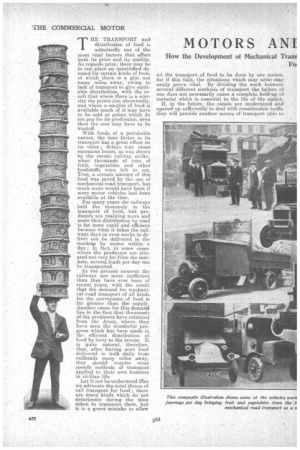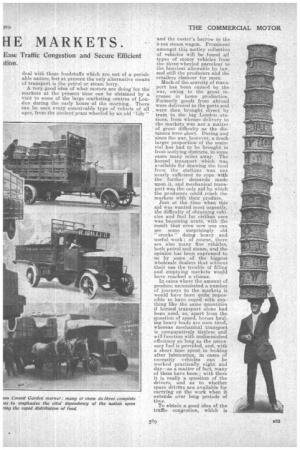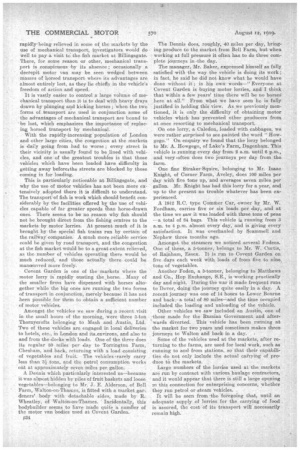MOTORS ANI FIE MARKETS.
Page 10

Page 11

Page 12

If you've noticed an error in this article please click here to report it so we can fix it.
How the Development of Mechanical Trans Else Traffic Congestion and Secure Efficient Ilion.
THE TRANSPORT and distribution of food is admittedly one of the most vital factors that affect both its price and its quality. As regards price, there may be in one place an unsatisfied demand for certain kinds of food, of which there is a glut not many miles away, owing to lack of transport to give equitable distribution, with the result that where there is a scarcity the prices rise abnormally, and where a surplus of food is available much of it may have to be sold at prices .which do not pay for its production. even then the rest may have to be wasted.
With foods of a perishable nature, the time factor in its transport has a great effect on its value; delays may cause enormous losses, as was shown by the recent railway strike, . when thousands of tons of . fruit, vegetables and other foodstuffs were left to rot. True, a certain amount of this food was saved by the use of mechanical road transport, but much more would have been if more motor vehicles had been available at the time.
For many years the railways held the monopoly in the transport of food, but producers are realizing more and more that distribution by road is far more rapid and efficient because what it takes the railways days or even weeks to deliver can be delivered in the markets by motor within a day ; in fact, in some cases where the producers are situated not very far from the markets, several loads per day can be transported.
At the present moment the railways are more inefficient than they have ever been of recent years, with the result that the demand for mechanical road transport of all kinds for the conveyance, of food is far greater than the supply. Another cause for this demand lies in the -fact that thousands of the producers have .returned from the Army, where they have seen the wonderful progress which has been made in. the efficient distribution of food by lorry to the troops. It is quite natural, therefore, that, after having seen food delivered in bulk daily from railheads many miles away, they should require more speedy methods of transport applied to their own business in civilian life.
Let it not be 'understood Oat we advocate the. total disuse of rail transport for food' there are many kinds which do not deteriorate during the time taken to transport them, but it is a grave Mistake to allow
all the transport of food to be done by one means, for if this fails, the situations which may arise may easily prove vital. By dividing the work between several-different methods of transport the failure of one does not necessarily cause a complete hold-up of material which is essential to the life of the nation.
If, in the future, the canals are modernized and opened up sufficiently to deal with considerable traffic they will provide another means of transport able to
deal with those foodstuffs which are not of a perishable nature, but at present the only alternative means of transport is the petrol or steam lorry. A very good idea of what motors are doing' for the , markets at the present time can be obtained by a visit to some of the large marketing centres of London during the early hours of the morning. There can be seen every conceivable type of vehicle of all ages, from the ancient pram wheeled by an old -lidy " and thecoster's barrowto the 5-ton steam wagon. Prominent amongst this motley collection of vehicles will be found all types of motor vehicles from the three-wheeled parcelear to the heaviest allowable by law, and still the producers and the retailers clamour for more.
Much of the scarcity of transport has been caused by the war, owing to the great increase in home production. Formerly goods from abroad were delivered to the ports and were then brought direct by. train to the big London stations, from whence delivery to the markets was not a matter of great difficulty as the distances were short. During and 'since the war, however, a much larger proportion of the material has had to be brought in • from outlying districts, in some cases many miles away. The horsed transport which was available for drawing the food from the stations was not nearly sufficient to cope with the , further demands made upon it, and mechanical transport was the only aid by which the producers • could reach the markets with their produce. • Just at the time when this aid was wanted most urgently, the difficulty of obtaining vehicles and fuel for civilian uses -was becoming a-cute, with the result that even now one can see some, -surprisingly old "crocks" doing heavy and useful work ; of course, there are also many fine vehicles, both petrol and steam, and the opinion has been expressed to us by some of the biggest wholesale dealers that without their use the trouble of filling and emptying markets would have reached a climax.
In cases where the amount of produce necessitated a number of journeys to the markets it would have been quae, impossible to have coped with anything like the same quantities if horsed transport alone had been used, as, apart from the question of speed, horses hauling heavy loads are soon tired, whereas mechanical transport is comparatively tireless and will -function with undiminished • efficiency BO long as the necessary fuel is provided, and, with a short time spent in looking after lubrication, in eases Of necessity vehicles can be worked practically night and day—as a matter of fact, many of them have been ; with them it is really a question of the drivers, and as to whether spare drivas -are available for carrying on the work when it extends over long periods of time.
To obtaina good idea of the traffic -congestion, which is rapidly-being relieved in some of the markets by the use of mechanical transport, inv.estigators would do well to pay a visit to' the.fish market at Billingsgate. There, for some reason or . other, mechanical transport is ,conspicuous by its absence; occasionally a decrepit motor van may be seen wedged between masses of horsed transport where its advantages are almost entirely lost, as they lie chiefly in the vehicle's freedom of action and speed.
It is vastly eaSier to control a large volume of mechanical transport than it is to deal with heavy drays drawn by plunging and kicking horses ; when the two forms of transport are used in conjunction some of the advantages of mechanical transport are hound to lost, which emphasizes the importance of replacing, horsed transport by mechanical With the rapidly-increasing population of London and other large cities, the congestion at the markets is daily going from bad to worse ; every street in their vicinity is usually found to be lined with vehicles, and one of the greatest troubles is that those vehicles which have been loaded have difficultain getting away beforesthe streets are blocked by those coming in for loading.
This is particularly noticeable at Billingsgate, and why the use of motor vehicles has not been more extensively adopted there it is difficult to understand. The transport offish is work which should benefit considerably by the facilities offered by the use of vehicles capable of far greater speeds Nan horse-drawn ones. There seems to be no reason why fish should not be brought direct from the fishing centres to the markets by motor lorries. At present much of it is brought .by the special fish trains run by certain of the railWay-•companies. A much more reliable service could be given by road transport, and the congestion at the fish market would be to a great extent relieved, as the number of vehicles operating there would be 'much reduced, and those actually there could be manteuvred more freely.
Covent Garden is one of the markets where the motor lorry is rapidly ousting the horse. Many of the smaller firms have dispensed with horses altogether while the big ones are running the two forms of transport in conjunction', merely because it has not been possible for them to .obtain a sufficient number of motor vehicles. • Amongst the vehicles we saw during a recent,visit in the small hours of the morning, were three a-ton Thornycrofts belonging to Mash and Austin, Ltd. Two of these vehicles are engagerlain local deliveries to hotels, etc., in London and its,environs, and also to and from the docks with loads. One of the three does its regular 80 miles per day to Torrington Farm, Cheaham, and back, returning with a. load -consisting of vegetables and fruit. The vehicles ,rarely carry less than 31 tons, and the petrol. consumption works out atapproximately seven miles per: gallon. • A Dennis which particularly interested us—because it was almost hidden by•piles, of fruit baskets and loose vegetables—belonging to Mr. I. E.. Alderson, of Bell Farm, Walton-on-Thames, is fitted with a market gars; deners' body -with detachable aides, made by R..Wheatley, of Walton-on-Thames._ I Incidentally, this bodybuilder seems to -have -m-ade qu'ite 'a—num-ger of the motor van -bodies used at Covent Garden.
p34 The Dennis does, roughly, 40 miles per day, bringing produce to the market from hell Farm, but when working at full pressure it often has to do three complete journeys in the day.
The manager, Mr. Baker, expressed himself as fully satisfied with the way the vehicle is doing its work ; in fact, he said he did net know what he Would have done without it; in his own words—"Everyone at Covent Garden is buying motor lorries, and I think that within a few years' time there will be no horse§ .her at all." From what we have seen he is fully justified in holding this view. As we previously mentioned, it is only the difficulty of obtaining motor vehicles which has prevented other producers from at once resorting to mechanical transport.
On one lorry, a Caledon, loaded with cabbages, we were rather surprised to see painted the word " Howgage." On enquiry we found that the lorry belonged to Mr. A. Howgego, of Lake's Farm, Dagenham. This vehicle is runningevery day from 2 a.m. until 6 p.m., and very /often does two journeys per day from the farm.
One fine Straker-Squire, belonging to Mr. Isaac Knight, of Corner Farm, Aveley, does 100 miles per day with five tong up, and averages seven miles per • gallon. Mr. Knight has had this lorry for ayear, and up to the present no trouble whatever has been experienced.
A 1912 R.C. type Clam/her Car, owner by Mr. Nir. Fordham, carries five or six loads per day, and at the time we saw it was loaded with three tons of peas —a total of 84 bags. This vehicle is running from 3 a.ra. to 4 p.m. almost every day, and is giving every satisfaction. It was overhauled by Sca,mmell and Nephew three months ago.
Amongst the steamers we noticed several Fodens. One of these, a 5-tonner, belongs to Mr. W. Curtis, of Rainhain, Essex. It is run to Covent Garden on five days each week with loads of from five to nine. tons of vegetables.
Another Foden, a 3-tonner, belonging to Matthews and Co., Hop Exchange, S.E., is working practically day and night. During the war it made frequent runs to Dover, doing the journey quite easily in a day. A recent journey was one of 14 hours to Lower Bourne and back---n total of 80 miles—and the time occupied included the loading and unloading of the vehicle. Other vehicles we saw included an Austin, one of -those made for the Russian Government and afterwards diverted. This vehicle has been running at the market for two years and sometimes makes three journeys to Walton and back in a day.
Some of the vehicles used at the markets, after returning to the farms, are used for local work, such as running to and from stations, so that their capabilities do not only include the actual c.airying of produce tothe markets.
Large numbers of the lorries used at the markets. are run by contract with various haulage contractors, and itwould appear that there is still a large opening in this connection for enterprising concerns, whether they run petrol or steamvehicles.
It will be aeen from 'the foregoing that, until an adequate supply of lorries for the carrying of food is -assured, the cost of its transport will necessarily remain high.
























